|
|
Nikita Magaloff (Piano) |
|
Born: February 8, 1912 - Saint Petersburg, Russia
Died: December 26, 1992 - Vevey, Switzerland |
|
The Georgian-Russian pianist, Nikita Magaloff, was born in Saint Petersburg to a Georgian noble family named Maghalashvili. When Nikita Magaloff was a child of six his parents fled Russia for Finland to escape the Revolution. The family stayed in Finland for four years, where Magaloff apparently had lessons from Alexander Siloti, The family then then travelled to the USA, and finally settled in Paris in 1922. Magaloff's first advanced studies were at the Paris Conservatoire, where he studied piano with Isidor Philipp, graduating at the age of 17 with a premier prix. Whilst in Paris he also received private lessons in composition from Sergei Prokofiev, who was a friend of the family, and high praise in the form of a testimonial from Ravel who wrote, ‘In Magaloff a great, a truly extraordinary musician is born.’ In Paris Magaloff also met Sergei Rachmaninov. The music and influence of those three composers figured prominently in Magaloff’s career. He also befriended the violinist Joseph Szigeti there, a man he credited with introducing him to a broad range of chamber music and whose daughter Irene he would later marry.
Nikita Magaloff was one of the more interesting and charismatic keyboard figures of the 20th century. Many of his recordings are still available and in modern sound. He concertized with the most important conductors and orchestras of the day and at the most prestigious festivals. He also collaborated with the leading string players.
From 1930 Nikita Magaloff was violinist Joseph Szigeti’s accompanist. They appeared at the Wigmore Hall in London in May 1933 and at the London Palladium in February 1934. At a solo recital in London’s Wigmore Hall in September 1935 Magaloff (for some reason referred to as ‘Prince’ Nikita Magaloff ) played Weber’s Piano Sonata No. 4 in E minor, some Frédéric Chopin and Scarlatti. Magaloff’s defining pianistic characteristics were noticed at the outset of his career by a critic of this concert, who commented on ‘…a limpid tone and a certain controlled impetuosity’.
At the outbreak of World War II Magaloff settled in Switzerland and his career, like those of many other musicians, was interrupted. Two years after the end of World War II he made his first tour of the USA and also toured Europe, South America and South Africa. From 1949 Magaloff took over his friend and colleague Dinu Lipatti's master-classes at the Geneva Conservatory after Dinu Lipatti's early death, and continued teaching there until 1959. After 1960 he gave summer courses in Taormina, Sicily and at the Accademia Musicale Chigiana in Siena. Among his many pupils were the pianists Martha Argerich, Andrea. Bacchetti, Michel Dalberto, Marilyn Engle, Daniel Höxter, Frédéric Meinders, Fritz Steinegger, Maria Tipo, Ingrid Haebler Andreas Klein, and Valery Sigalevitch, and the organist Lionel Rogg. Between 1965 and 1988 Magaloff presided over the Clara Haskil Piano Competition at the Montreux-Vevey Festival.
Nikita Magaloff’s London appearances during the 1950’s and 1960’s did not receive very favourable criticism, but perhaps, in playing works such as Sergei Rachmaninov’s Piano Concerto No. 3 in D minor Op. 30 and Franz Liszt’s Piano Concerto No. 1 in E flat (which was remarkably described as containing ‘banging, splashing and meaningless rubato’) he was programming music uncongenial to him. However, in the autumn of 1972 Magaloff gave six recitals of the complete works of F. Chopin in London, the first pianist to do so since Alexander Brailowsky in the 1930’s.
He remained busy throughout the last three decades of his career, hardly slowing down even near the end: in the 1990-1991 season, he gave a six-concert series that covered nearly the complete F. Chopin output. He died in Vevey, Switzerland, of cancer on December 26, 1992. |
|
Repertoire and Style |
|
Nikita Magaloff claimed that his musicianship came ‘…from hearing and not from study’. He heard Sergei Rachmaninov play as often as he could. ‘I think I learnt more from him than from my teachers.’ He also admitted to being deeply influenced by hearing Walter Gieseking, and the revealing musicianship of Edwin Fischer and Artur Schnabel. ‘Refined virtuosity’ and ‘spontaneous lyricism’ are typical descriptions of Magaloff’s playing. His style was one of sophistication and taste, a sort of controlled bravura where one felt that Magaloff was listening intently to every note he played.
Nikita Magaloff had a broad repertoire that favoured F. Chopin, but his repertoire also included L.v. Beethoven, Johannes Brahms, Luigi Dallapiccola, Debussy, Gabriel Fauré, Haydn, Felix Mendelssohn, Franz Liszt, W.A. Mozart, Prokofiev, Sergei Rachmaninov, Ravel, Scarlatti, Schubert, Robert Schumann, Scriabin, Soler, Igor Stravinsky (Magaloff played all his piano works), Tchaikovsky, and numerous others. but he will be remembered most for his performances and recordings of F. Chopin.
Nikita Magaloff was best known for his espousal of the music of F. Chopin. he played many all-F. Chopin concerts and had the distinction of being the first pianist to record all of F. Chopin's piano music. While these recordings have been criticised for their failure to plumb the depths of F. Chopin's works, they were innovative for their textual fidelity and unsentimentality. Magaloff, for example, preferred and recorded F. Chopin's own manuscript versions of the waltzes rather than the familiar versions published posthumously by Julian Fontana.
His interpretations of Felix Mendelssohn are also striking, finding a vein of melancholy that is often missed. Magaloff's playing carried the hallmarks of Isidor Philipp's elegant, refined style, though he himself rejected the sentimental interpretations of Isidor Philipp's generation (he was especially critical of Paderewski whom he believed had "falsified Chpin"). He once described himself to the critic and writer Piero Rattalino as 'a vieux style pianist'.
While from the 1920’s through the 1950’s Nikita Magaloff was active in the concert hall and recorstudio, his career seemed to take wing after 1960. His playing underwent a change in his later years, becoming more passionate, daring and challenging and with with more spirit. He remarked, in an interview with Eugenio Scalfari "at the age of seventy, I have come to the conclusion that only the sentiment and fear of death can induce an immoderate passion for life." His last recordings bear eloquent tribute to this 'immoderate passion for life'.
Magaloff was also a composer of a violin sonatina, a piano toccata, songs, and cadenzas for some of W.A. Mozart’s piano concertos. |
|
Recordings |
|
Nikita Magaloff’s first recordings were made with Joseph Szigeti between 1933 and 1937. Highlights from these sessions, which reveal much of the piano, include Szymanowski’s La Fontaine d’Aréthuse and Igor Stravinsky’s Danse russe from Petrushka.
Most of Magaloff's available recordings were made after 1960, the best come from the early 1960’s. Many of his recordings are available on Philips and Decca. For Philips he recorded an excellent account of Franz Liszt’s six Grandes études d’après Paganini. This is a view of Franz Liszt far removed from the high-octane accounts of today’s young pianists. Magaloff brings an unusual elegance to these works and in doing so makes them what they are: music, and not just technical studies. At the same time, he recorded Robert Schumann’s Carnaval Op. 9, again in a performance of controlled bravura. Both of these performances were included in Philips’ Great Pianists Series. In the second half of the 1970s Magaloff set down his marathon cycle of the complete solo works of F. Chopin, plus those for piano duet and two pianos. These have been reissued on thirteen compact discs and contain some fine playing in a warm recorded sound. Magaloff’s recordings of works such as the Barcarolle Op. 60 are particularly effective due to his subtle tone quality and regal delivery. In 1955 Magaloff recorded Igor Stravinsky’s Concerto for piano and wind instruments and Capriccio for piano and orchestra with Ernest Ansermet and L'Orchestre de la Suisse Romande.
A good sample of Magaloff’s playing can be found in a live recital from the 1969 Salzburg Festival. This has been issued on CD by Orfeo and is an interesting programme of Felix Mendelssohn’s rarely-heard Piano Sonata in B flat Op. 106, Luigi Dallapiccola’s Sonatina canonica sopra capricci di Niccolò Paganini, L.v. Beethoven’s ‘Appassionata’ Sonata Op. 57 and Ravel’s Gaspard de la nuit. The L.v. Beethoven is given a somewhat uncharacteristically dramatic performance, the last movement thrilling as it rushes headlong to its conclusion, whilst the Ravel is one of the most interesting performances on disc. In Scarbo Magaloff may miss a few of the notes, but his palette of tone colours and many different touches is extraordinary and very refreshing to hear. New York Times critic Harold Schonberg thought this version of Gaspard de la nuit ‘…should go to the top of the list’.
Ninita Magaloff continued to play until the end of his life, and some of his later live performances have been issued on CD. An Italian broadcast from 1991 was issued by Ermitage and contains a sublime performance of Franz Liszt’s Les cloches de Genève from the Années de pèlerinage, but Magaloff finds Au bord d’une source rather more taxing. More live material has been issued by Disques Montaigne. Most of the recordings come from the 1988 Montreux-Vevey Festival, but a disc of Scriabin was recorded in July 1992 shortly before Magaloff’s death. |
|
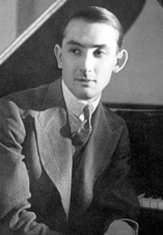
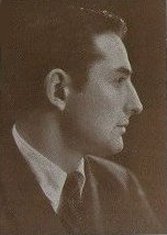
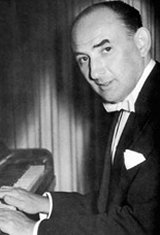 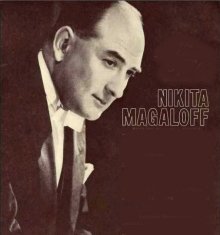
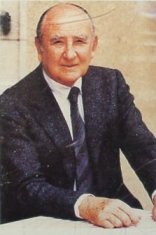
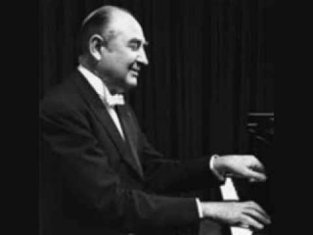
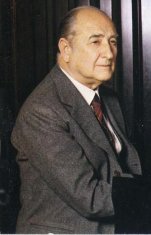
|
|
More Photos |
|
Source: Wikipedia Website (May 20111); All Music Guide (Author: Robert Cummings); Naxos Website
Contributed by Aryeh Oron (June 2011) |
|
Nikita Magaloff : Short Biography | Recordings of Instrumental Works |
|
Links to other Sites |
|
Nikita Magaloff (Wikipedia)
Nikita Magaloff - Biography (AMG) |
Nikita Magaloff - Biography (Naxos)
Blessings that grow with age by Harry Eyres (FT.com) |
|
|